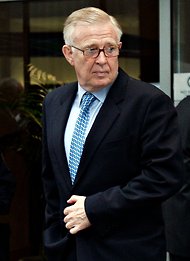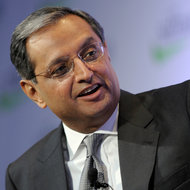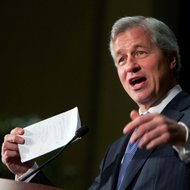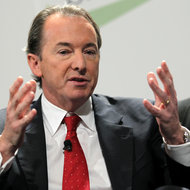 Shannon Stapleton/ReutersMichael O’Neill, the chairman of Citigroup, in 2009.
Shannon Stapleton/ReutersMichael O’Neill, the chairman of Citigroup, in 2009.
The departure of Vikram S. Pandit shows clearly who is in charge of Citigroup: the board of directors. For good or for bad, boards are increasingly taking charge of corporate America. The reign of the imperial chief executive is over.
No reason was given in the news release announcing that Mr. Pandit had stepped down. And while the reports of what happened behind the scenes will slowly emerge as each side spins its story, there is no doubt that this was an unexpected and abrupt resignation. He left without the words that you usually see in such announcements about “spending more time with your family” or even language about “retirement” — and just as his compensation was beginning to rise again into the tens of millions of dollars.
The new show of power by the board is a remarkable turn of events. In the years leading up to the financial crisis, boards were criticized for letting chief executives rule unchecked. Remember, Citigroup was the place where Sandford I. Weill reigned supreme for years. It led to Charles O. Prince III, who lacked the ability to run the financial conglomerate but also lacked a board that could appropriately supervise and monitor his actions let alone make a decision about the direction of the company. (Mr. Prince was the one, you may recall, who said in the years leading up to the financial crisis that “as long as the music is playing, you’ve got to get up and dance.”
Deal Professor
View all posts
Board supremacy is a general trend. In the wake of the financial crisis, the big banks have been forced to reconstitute their boards, with Citigroup and Bank of America at the top of the list. But others like Goldman Sachs have also been pushed to bring in more competent people. The new directors are much more aware of what happened in the years leading up to the financial crisis, and to take action.
Not only have boards been pushed to bring in new, more active people, political and market forces are pushing boards into a greater role in the banks themselves. The Dodd-Frank Act charges boards with an enhanced duty to monitor systemic risk at financial institutions and requires the creation of risk management committees made up of independent directors for these banks.
Corporate governance advocates, meanwhile, are pushing boards to take a more active role not only in the hiring and firing of the chief executive but in the operation of the company.
The consequence is that not only do boards have more legal responsibility to run the company, they are being exhorted to do so. Boards are listening. The change is real and amply underscored in the shakeup at Citigroup. Mr. Pandit’s resignation is remarkable because it goes beyond what had been the traditional board role, which has been to stand back and hire or fire the chief executive. Here, the board appeared to want to change the course of Citigroup’s operations against the wishes of Mr. Pandit.
The lesson of Pandit’s departure is that boards are now expanding their focus and looking to veto or change a company’s direction and operations. And that it is happening at a place like Citigroup, where for years being a director was more like being a minor royal – not much responsibility, but nice perks — is doubly remarkable.
The real question though is whether boards can run companies better than chief executives can. Boards comprise part-time members who don’t have the same interests at stake. They are also committees and thus may lack the wherewithal to properly execute. In fact, some blame the financial crisis on the failure of boards to correctly monitor financial institutions. But that is a developing story.
For now, we’re now in a new world where the boards rule and are unafraid to exert their power. Chief executives, beware.
Article source: http://dealbook.nytimes.com/2012/10/16/in-citigroup-shake-up-a-new-show-of-power-by-boards/?partner=rss&emc=rss





